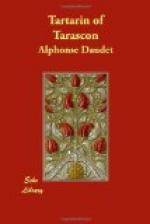Flags of all countries floated — English, American, Russian, Swedish, Greek and Tunisian.
The vessels lay alongside the wharves — ay, head on, so that their bowsprits stuck up out over the strand like rows of bayonets. Over it, too, sprawled the mermaids, goddesses, madonnas, and other figure-heads in carved and painted wood which gave names to the ships — all worn by sea-water, split, mildewed, and dripping. Ever and anon, between the hulls, a patch of harbour like watered silk splashed with oil. In the intervals of the yards and booms, what seemed swarms of flies prettily spotted the blue sky. These were the shipboys, hailing one another in all languages.
On the waterside, amidst thick green or black rivulets coming down from the soap factories loaded with oil and soda, bustled a mass of custom-house officers, messengers, porters, and truckmen with their bogheys, or trolleys, drawn by Corsican ponies.
There were shops selling quaint articles, smoky shanties where sailors were cooking their own queer messes, dealers in pipes, monkeys, parrots, ropes, sailcloth, fanciful curios, amongst which were mingled higgledy-piggledy old culverins, huge gilded lanterns, worn-out pulley-blocks, rusty flukeless anchors, chafed cordage, battered speaking-trumpets, and marine glasses almost contemporary with the Ark. Sellers of mussels and clams squatted beside their heaps of shellfish and yawped their goods. Seamen rolled by with tar-pots, smoking soup-bowls, and big baskets full of cuttlefish, from which they went to wash the ink in the milky waters of the fountains.
Everywhere a prodigious collection of all kinds of goods: silks, minerals, wood in stacks, lead in pigs, cloths, sugars, caruba wood logs, colza seed, liquorice sticks, sugar-canes. The East and the West cheek by jowl, even to pyramids of Dutch cheeses which the Genoese were dyeing red by contact with their hands.
Yonder was the corn market: porters discharging sacks down the shoots of lofty elevators upon the pier, and loose grain rolling as a golden torrent through a blonde dust. Men in red skullcaps were sifting it as they caught it in large asses’-skin sieves, and loading it upon carts which took their millward way, followed by a regiment of women and youngsters with wisps and gleaning baskets. Farther on, the dry docks, where large vessels were laid low on their sides till their yards dipped in the water; they were singed with thorn-bushes to free them of sea weed; there rose an odour of pitch, and the deafening clatter of the sheathers coppering the bottoms with broad sheets of yellow metal.
At whiles a gap in between the masts, in which Tartarin could see the haven mouth, where the vessels came and went: a British frigate off for Malta, dainty and thoroughly washed down, with the officer in primrose gloves, or a large home-port brig hauling out in the midst of uproar and oaths, whilst the fat captain, in a high silk hat and frockcoat, ordered the operations in Provencal dialect. Other craft were making forth under all sail, and, still farther out, more were slowly looming up in the sunshine as if they were sailing in the air.




